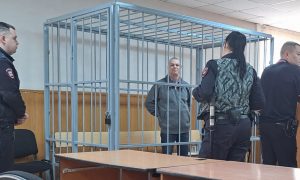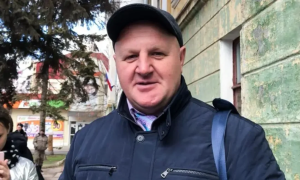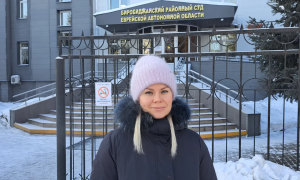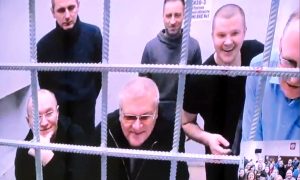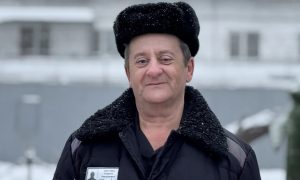In the first prosecution since the Jehovah’s Witness ban came into force, Kursk prosecutors are investigating a woman on “extremism” criminal charges for offering leaflets to passers-by. Elsewhere, Jehovah’s Witness elder Yury Zalipayev is under investigation on “extremism” charges. Five Muslim Nursi readers are on trial.

For the first time since the complete Russian ban on Jehovah’s Witness activity came into force on 17 July, prosecutors in the city of Kursk have opened a criminal case against a woman allegedly trying to “recruit” people to an “extremist organisation” by handing out leaflets to passers-by.
The woman – who has not yet been named – is under “preliminary investigation” under Criminal Code Article 282.2, Part 1.1.
Elsewhere, prosecutors have opened an “extremism” case against another Jehovah’s Witness. Yury Zalipayev, a Jehovah’s Witness elder in the North Caucasus Republic of Kabardino-Balkariya, is under investigation for inciting religious hatred (Criminal Code Article 282, Part 1) for allegedly telling members of his congregation to distribute a banned text deemed to denigrate “Christian clergy”. Prosecutors have not yet submitted Zalipayev’s case to court (see below).
This is the second such case initiated in Kabardino-Balkariya in recent months. The first, against elder Arkady Akopyan (also under Criminal Code Article 282, Part 1), is currently being heard at Prokhladny District Court (see below).
Danish citizen Dennis Christensen’s pre-trial detention in Oryol has been extended until 23 November, Jehovah’s Witnesses report on the jw-russia.org news website, which is administered from abroad. This prosecution, on charges of “organising the activities of a banned extremist organisation” (Criminal Code Article 282.2, Part 1), is related to the June 2016 liquidation of the Oryol Jehovah’s Witness community, not that of the Administrative Centre (see F18News 23 June 2017Â http://www.forum18.org/archive.php?article_id=2290).
Meanwhile, Moscow Regional Court has upheld the acquittal of two Jehovah’s Witnesses on “extremism” criminal charges, bringing to an end a case which began nearly seven years ago (see below).
Muslims who read the works of late Turkish theologian Said Nursi are also being prosecuted under the Extremism Law. Forum 18 is aware of five men currently on trial for allegedly “continuing the activities” of “Nurdzhular” (which was banned as “extremist” in 2008 but which Muslims in Russia deny even exists). Five more are under investigation, and another is appealing against his recent conviction (see below).
While ostensibly aimed at preventing the incitement of violence and hatred on racial, religious, and social grounds, the 2002 “Extremism” Law and associated articles of the Criminal and Administrative Codes are regularly used against religious communities and individuals for beliefs and practices which do not violate the human rights of others (see Forum 18’s Russia “extremism” religious freedom survey http://www.forum18.org/archive.php?article_id=2215).
First criminal prosecution after Jehovah’s Witness ban
Prosecutors in Kursk have launched a criminal case against a woman for allegedly trying to involve people in an “extremist organisation”, after a local resident complained to police that she had been handing out religious literature in the city’s central market.
This is the first known instance of an individual Jehovah’s Witness being accused of a criminal offence for engaging in religious activity since the Supreme Court’s ban came into force on 17 July (see F18News 18 July 2017Â http://www.forum18.org/archive.php?article_id=2297).
The woman and her fifteen-year-old son were distributing leaflets “urging passers-by to become members of the Jehovah’s Witnesses”, according to an 11 August statement by Kursk’s Central Administrative District Prosecutor’s Office. The statement notes that they had with them the appropriate documentation for carrying out “missionary activity”.
Since the nationwide prohibition on Jehovah’s Witness activity came into force on 17 July and the two Jehovah’s Witnesses allegedly handed out the leaflets on 4 August, prosecutors deemed this to be “illegal distribution of the agitational materials of a banned extremist organisation”.
The woman, whose name has not been released, is facing charges under Criminal Code Article 282.2, Part 1.1 (at fifteen, her son is below the age of criminal responsibility under Russian law, which is set at sixteen for most offences).
Article 282.2, Part 1.1, was introduced to the Criminal Code in 2014 and punishes “the recruitment or other involvement of a person in the activities of an extremist organisation”. If convicted, the woman could receive any of the following punishments: a fine of 300,000 to 700,000 Roubles or two to four years’ wages; compulsory labour of two to five years; or a prison sentence of four to eight years.
A fine of 300,000 Roubles (40,000 Norwegian Kroner, 4,300 Euros or 5,000 US Dollars) represents about nine months’ average wages for those in work or nearly two years’ average state retirement pension.
Previous criminal cases against Jehovah’s Witnesses have usually been brought under Article 282 (incitement of religious hatred), including the two ongoing prosecutions in Kabardino-Balkariya (see below). Sixteen people in Taganrog were prosecuted under Article 282.2, Parts 1 and 2 (organising or participating in the activities of a banned extremist organisation) for continuing to meet after their local Jehovah’s Witness community was liquidated and banned in 2009. Dennis Christensen (see below) has also been charged under Article 282.2, Part 1, which is related to an earlier ban on the Oryol community.
Second prosecution in Kabardino-Balkariya
Prosecutors in the North Caucasus town of Maysky are investigating 54-year-old Yury Viktorovich Zalipayev, chair of the now-liquidated local Jehovah’s Witness congregation. He is being investigated for allegedly inciting hatred towards “Christian clergy”, apparently by giving parishioners copies of a banned magazine (one of whom later distributed it in public).
The investigation is continuing and charges have not yet been brought, Maysky District Prosecutor’s Office told Forum 18 on 24 August. The case is unrelated to the ban on the Administrative Centre, as the alleged offence took place over a year ago.
Zalipayev is accused of an offence under Criminal Code Article 282, Part 1 – publicly performed “actions aimed at the incitement of hatred or enmity, as well as humiliation of a person or group”, based on gender, race, nationality, language, origin, attitude to religion, or social group. This carries possible punishments of: a fine of 300,000 to 500,000 Roubles or 2 to 3 years’ wages; compulsory labour for one to four years; or 2 to 5 years’ imprisonment.
According to the Prosecutor’s Office, Zalipayev has not been placed in detention or under house arrest or travel restrictions. As of 25 August, he has not been added to the Rosfinmonitoring list of “terrorists and extremists”.
According to the Maysky Inter-District Investigative Committee’s official notification of the opening of the case on 10 August, seen by Forum 18, Zalipayev “knowingly .. decided on 16 August 2016 to carry out public actions aimed at inciting hatred and enmity towards a social group, ‘Christian clergy’, wherefore he decided to distribute a printed publication from the Federal List of Extremist Materials” to attendees at an evening service, “wishing to acquaint the widest possible circle of people with ideas and statements containing [this] negative evaluation”.
The publication in question was an August 2009 issue of the journal “Awake!” entitled “Prejudice and Discrimination: Getting to the Roots” (banned by Factory District Court, Kemerovo, on 28 October 2010).
The document states that Zalipayev gave three copies to E. Kireyev (who later reported him to the police), and “having the idea of further distributing this publication to an unlimited circle of people, he instructed [community member] O.V. Makarova to hand it out .. among the residents of Maysky”. Makarova did this the next day, “following Zalipayev’s order”, outside a hospital and a leisure centre.
As a result, Maysky District Court fined the Maysky Jehovah’s Witness community 200,000 Roubles under Administrative Code Article 20.29 on 9 November 2016. According to the verdict in this case, after Kireyev’s tip-off, law enforcement agents searched the community’s premises and found seven more copies of the banned August 2009 issue of “Awake!”
Jehovah’s Witnesses themselves claim that these had been planted by FSB security service officers during the search, which took place in darkness as the power had gone out immediately before, and in the absence of community members, as officers had made them stay in one room.
Sergiyev Posad acquittal upheld
On 24 August, Moscow Regional Court upheld the acquittal of Jehovah’s Witness elders Vyacheslav Yuryevich Stepanov (born 20 March 1977) and Andrei Petrovich Sivak (born 28 March 1974) on charges of inciting religious hatred.
Prosecutors had appealed against the 23 June ruling by Sergiyev Posad City Court, which had declared the two men not guilty of organising gatherings, “veiled under the guise of ‘religious meetings'”, with the aim of “inciting hatred and enmity against followers of all religions other than adherents of the ‘Jehovah’s Witnesses’ religious organisation, and humiliating human dignity on the grounds of religion”.
The two men had originally been acquitted at the same court on 4 March 2016, but were forced to undergo repeat proceedings after Moscow Regional Court overturned this ruling on 26 May 2016 at the request of prosecutors.
Sivak and Stepanov were charged under Criminal Code Article 282, Part 2. This punishes publicly performed “actions aimed at the incitement of hatred or enmity, as well as humiliation of a person or group”, based on sex, race, nationality, language, origin, attitude to religion, or social group”, when committed a) with violence or the threat of violence; b) by a person using their official position; c) by an organised group (of which Stepanov and Sivak were accused).
They were originally brought to Sergiyev Posad City Court in August 2015, after an unusually long investigation beginning in April 2013 (and based on surveillance which dated back to 2010), during which Sivak and Stepanov were added to the Interior Ministry wanted persons database on three occasions without any grounds and without their knowledge (see F18News 26 January 2017Â http://www.forum18.org/archive.php?article_id=2250).
As of 25 August, Sivak and Stepanov are still on the Rosfinmonitoring list of “terrorists and extremists”, but their names should be removed now that their acquittal has entered legal force.
Other criminal prosecutions of Jehovah’s Witnesses continue
Danish citizen Dennis Ole Christensen (born 18 December 1972) remains in custody in Oryol, charged under Criminal Code Article 282.2, Part 1, with the “organisation of the activities of a banned extremist organisation”. His pre-trial detention period was extended by the city’s Soviet District Court on 20 July for another four months, until 23 November 2017. The court refused to allow him to be placed under house arrest, but agreed to the defence’s request for a public hearing, the jw-russia.org news website reported on 22 July.
The police and FSB security service arrested Christensen during a raid on a Bible study meeting on the evening of 25 May (see F18News 23 June 2017 http://www.forum18.org/archive.php?article_id=2290). He was then accused of being a leader of the banned Oryol Jehovah’s Witness community, which was ruled “extremist” and liquidated in June 2016 – a charge he denies. As of 25 August, he does not appear on the Rosfinmonitoring list of “terrorists and extremists”.
Christensen’s prison address is:
302040 Oryol
ulitsa Krasnoarmeyskaya 10
Sledstvenny Izolyator No. 1
The trial of 69-year-old Arkady Akopovich Akopyan, head of the Prokhladny Jehovah’s Witness community in Kabardino-Balkariya, is continuing before Judge Oleg Golovashko at Prokhladny District Court. The most recent hearing took place on 25 July. As of 25 August, he has not been added to the Rosfinmonitoring list of “terrorists and extremists”.
Akopyan has also been charged under Criminal Code Article 282, Part 1 (publicly performed “actions aimed at the incitement of hatred or enmity, as well as humiliation of a person or group”, based on gender, race, nationality, language, origin, attitude to religion, or social group), and stands accused of giving sermons in which he “degraded the dignity of adherents of other religions”, as well as of distributing banned “extremist” literature among members of his congregation.
If convicted, Akopyan may receive the following possible punishments: a fine of 300,000 to 500,000 Roubles; or 2 to 3 years’ income; or compulsory labour (prinutdelnaya rabota) for 1 to 4 years with a ban on working in one’s profession for up to 3 years; or 2 to 5 years’ imprisonment.
Cases against Nursi readers continuing
Criminal Code Article 282.2 has long been used against Muslims alleged to be members of “Nurdzhular”, which the Supreme Court outlawed as “extremist” in 2008 but which Muslims in Russia deny even exists. Muslims who meet to study the works of late Turkish theologian Said Nursi are regularly charged with “continuing the activities of a banned extremist organisation”, and have received large fines and, in some cases, custodial sentences.
Five men are currently on trial for alleged involvement in “Nurdzhular”, with the investigations of another five continuing. Yevgeny Kim, who was found guilty under Criminal Code Article 282.2, Part 1, on 19 June, has appealed against his conviction.
Blagoveshchensk
Yevgeny Lvovich Kim (born 5 October 1974) has appealed against his conviction under Criminal Code Article 282.2, Part 1 and Article 282, Part 1. The latest hearing took place at Amur Regional Court on 24 August before Judge Yury Melnichenko.
For holding meetings to study Nursi’s works, Blagoveshchensk City Court found Kim guilty on 19 June of organising gatherings of “Nurdzhular”. The formal charges, seen by Forum 18, claimed that this “threatens inter-ethnic and inter-confessional stability in society and the territorial integrity of the state”. Prosecutors also accused Kim of exerting “active influence on the sub-consciousness, consciousness, will, and behaviour of people attending the gatherings, with the aim of formulating in them a feeling of hatred and enmity, and also of humiliating the dignity of a person or group of people on grounds of religion and social grouping”.
Kim and several friends were detained and interrogated after an armed FSB unit raided Kim’s flat on 26 December 2015, during a gathering to celebrate the birthday of the Muslim Prophet Mohammed (see F18News 21 January 2016Â http://www.forum18.org/archive.php?article_id=2141). All but Kim were later released.
According to Judge Aleksei Salnikov’s 19 June verdict, see by Forum 18, Kim received a custodial sentence “since his correction is possible only in conditions of real isolation from society”.
For the Criminal Code Article 282.2, Part 1 offence, the judge handed down 3 years and 6 months in prison, plus one year of restrictions on freedom (a 10pm to 6am curfew; a bar on moving house or leaving one’s place of residence without the permission of probation authorities; a requirement to register with the probation authorities twice a month). For the Criminal Code Article 282, Part 1 offence, Kim was given one year in prison.
Because of the time Kim has already spent in custody, this comes out as a total of 3 years and 9 months’ imprisonment, which, if his appeal is unsuccessful, he will serve in a general-regime prison colony. Kim is being kept in custody until the verdict comes into force.
The verdict also stipulates that large quantities of “extremist” religious literature seized from Kim (mainly Nursi’s books), as well as notebooks, DVDs, and sim cards, should be destroyed when the ruling comes into force. Kim’s prayer rugs and other small personal items are to be returned to him, although several mobile phones will remain confiscated.
Mobile phones and tablet computers which law enforcement agents confiscated from witnesses are to be returned to them, but copies of Nursi’s writings found in their homes are also to be destroyed.
Judge Salnikov ordered that other books, including copies of the Koran, belonging to Kim’s friend Anton Starodubtsev, should be handed back to FSB investigators as material relevant to another criminal case. Starodubtsev has also been charged under Criminal Code Article 282.2, Part 2 (“participation in the activities of a banned extremist organisation”), but his whereabouts remain unknown.
Krasnoyarsk
Nursi readers Andrei Nikolayevich Dedkov (born 16 June 1979) and Andrei Gennadyevich Rekst (born 14 March 1994) are still on trial at Krasnoyarsk’s Soviet District Court and Sverdlovsk District Court respectively (see F18News 12 May 2017Â http://www.forum18.org/archive.php?article_id=2279). Dedkov is next due to appear on 29 September and Rekst on 18 September. Both men appear on the Rosfinmonitoring list.
Prosecutors are also seeking to have books by Nursi, found in Rekst’s flat, ruled “extremist”. Judge Natalya Bogdevich of Sverdlovsk District Court requested repeat “expert analysis” on 22 June and has suspended proceedings in this case while this is carried out.
Dagestan
The trial of three readers of Nursi’s works from Dagestan – Ziyavdin Badirsoltanovich Dapayev (born 12 May 1982) and brothers Sukhrab Abdulgamidovich Kaltuyev (born 13 November 1981) and Artur Abdulgamidovich Kaltuyev (born 15 June 1986) – is continuing at Lenin District Court in Makhachkala. There have been 12 hearings so far, most recently on 21 August. The next is scheduled for 25 August, according to the court website. All three are facing charges under Criminal Code Article 282.2, Part 1, and all have been added to the Rosfinmonitoring list.
A fourth Dagestan resident remains in pre-trial detention on the same charges, but in a separate case (see F18News 12 May 2017Â http://www.forum18.org/archive.php?article_id=2279).
Ilgar Vagif-ogly Aliyev, who was arrested in Izberbash on 19 April, may become the first person to be tried for a Criminal Code Article 282.2 offence with the possibility of harsher punishments introduced by amendments to the Extremism Law in July 2016. If convicted, he could receive up to ten years’ imprisonment. His name has not yet been added to the Rosfinmonitoring list of “terrorists and extremists”, as of 25 August.
Aliyev’s prison address is:
367012 Respublika Dagestan
Makhachkala
ulitsa Levina 45
Sledstvenny Izolyator No. 1
Novosibirsk
Four Muslims – Komil Olimovich Odilov (born 18 August 1975), Uralbek Karaguzinov (born 21 July 1954), Mirsultan Takhir-ogly Nasirov (born 8 October 1997), and Timur Muzafarovich Atadzhanov (born 21 April 1988) – remain under investigation, charged under Criminal Code Article 282.2, Parts 1 and 2 (see F18News 12 May 2017 http://www.forum18.org/archive.php?article_id=2279).
Odilov’s lawyer Yuliya Zhemchugova, told Forum 18 on 18 August that the investigation has been extended again and it is unknown when her client will appear in court. She believes that investigators are still awaiting the results of “expert analysis” of the cases materials by religious studies specialists.
All four Novosibirsk defendants have been added to the Rosfinmonitoring list. (END)
http://www.forum18.org/archive.php?article_id=2310Â
